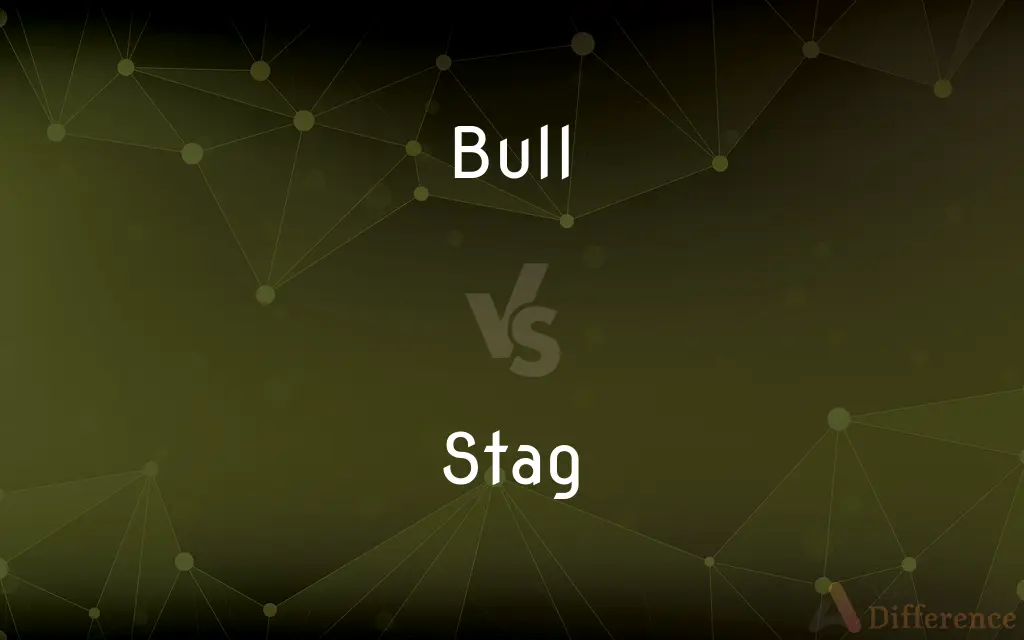Bull vs. Stag — What's the Difference?
By Tayyaba Rehman & Maham Liaqat — Updated on April 8, 2024
A bull refers to an investor who expects prices to rise and invests accordingly, while a stag is an investor who buys new stock issues hoping to sell them quickly for a profit.

Difference Between Bull and Stag
Table of Contents
ADVERTISEMENT
Key Differences
A bull is an investor who operates under the belief that market prices, for stocks or other assets, will increase. They are optimistic about the market's future performance and make investment choices based on this outlook, often holding positions for a longer term. On the other hand, a stag is a type of investor who specifically targets new stock issues, purchasing shares with the intention of selling them soon after the initial public offering (IPO) at a higher price. This strategy is less about the market's general direction and more about capitalizing on short-term price movements associated with new listings.
Bull investors are characterized by their strategy of buying and holding securities for a period, anticipating that their value will grow over time. They may invest in stocks, bonds, real estate, or any asset class they believe will appreciate. Stags, whereas, are opportunistic investors focusing almost exclusively on IPOs and new issues, aiming to profit from the initial surge in stock prices that may follow a company's market debut.
The term "bull" symbolizes strength and optimism in the financial markets, representing an investor's confidence in the market's upward trajectory. Bulls contribute to market liquidity and can drive up asset prices through their buying activities. Conversely, stags play a more speculative role, often acting quickly to flip new shares for a profit. Their actions can add volatility around the time of an IPO, as they may increase demand initially but sell off their holdings shortly after.
Bull investors typically adopt a long-term perspective, conducting thorough research to select investments that they believe will succeed in the future. This approach contrasts with stags, who might rely more on timing and market conditions specific to IPOs, without a long-term commitment to the underlying asset. While bulls are seen as supporters of the market's growth, stags are viewed as taking advantage of short-term market inefficiencies.
The strategies employed by bulls and stags reflect different risk profiles and investment philosophies. Bulls accept the risk of short-term fluctuations in market prices, believing in long-term gains. Stags, on the other hand, seek to minimize exposure to long-term market risks by capitalizing on short-term opportunities, often requiring a keen sense of market timing and trends.
ADVERTISEMENT
Comparison Chart
Investment Focus
Long-term growth in market prices.
Short-term profit from new stock issues.
Strategy
Buy and hold.
Buy and sell quickly after IPO.
Market Outlook
Optimistic, expects prices to rise.
Opportunistic, focuses on immediate profit.
Asset Preference
Varied, including stocks, bonds, real estate.
Primarily new stock issues and IPOs.
Role in Market
Contributes to market growth and liquidity.
Adds volatility, especially around IPOs.
Risk Profile
Accepts long-term market fluctuations.
Seeks to minimize long-term risk through timing.
Research Approach
Thorough analysis of long-term prospects.
Focus on timing and market conditions of IPOs.
Compare with Definitions
Bull
An investor who believes market prices will rise.
A bull might buy more stocks during a downturn, anticipating a rebound.
Stag
An investor targeting new stock issues for quick profits.
A stag applies for IPO shares, hoping to sell them on listing day for a gain.
Bull
Focuses on long-term investment growth.
Bulls invest in industries they believe will grow over the next decade.
Stag
Employs a strategy based on market timing.
Successful stags excel at predicting the perfect time to sell IPO shares.
Bull
Optimistic about market prospects.
A bull remains positive even when market trends appear bearish.
Stag
Adds to IPO volatility through quick sells.
The quick sell-off by stags can contribute to price swings post-IPO.
Bull
Supports overall market liquidity and growth.
Bullish buying can stimulate trading and elevate market levels.
Stag
Focuses on short-term opportunities in IPOs.
Stags closely monitor upcoming IPOs to find profitable flips.
Bull
Buys and holds assets expecting appreciation.
Bulls often have portfolios designed for holding over years.
Stag
Seeks immediate profit from buying and selling.
A stag might sell newly listed shares within days or even hours.
Bull
A bull is an intact (i.e., not castrated) adult male of the species Bos taurus. More muscular and aggressive than the females of the same species, the cows, bulls have long been an important symbol in many cultures, and play a significant role in beef ranching, dairy farming, and a variety of other cultural activities, including bullfighting and bull riding.
Stag
The adult male of various deer, especially the red deer.
Bull
An uncastrated male bovine animal
Bull calves
Stag
A person who attends a social gathering unaccompanied by a partner, especially a man who is unaccompanied by a woman.
Bull
A bullseye
Aim for the bull!
Stag
A social gathering for men only.
Bull
A person who buys shares hoping to sell them at a higher price later.
Stag
Of or for men only
A stag party.
Bull
A papal edict
The Pope issued a bull of excommunication
Stag
Pornographic
Stag films.
Bull
Stupid or untrue talk or writing; nonsense
Much of what he says is sheer bull
Stag
Unaccompanied
Went to the dance stag.
Bull
Push or move powerfully or violently
He bulled the motor cycle clear of the tunnel
Stag
To attend a social gathering unaccompanied by a partner. Used especially of men.
Bull
(of a cow) behave in a manner characteristic of being on heat.
Stag
(countable) An adult male deer.
Bull
An adult male bovine mammal.
Stag
(countable) A colt, or filly.
Bull
The uncastrated adult male of domestic cattle.
Stag
A romping girl; a tomboy.
Bull
The adult male of certain other large animals, such as alligators, elephants, moose, or whales.
Stag
(countable) An improperly or late castrated bull or ram – also called a bull seg (see note under ox).
Bull
An exceptionally large, strong, and aggressive person.
Stag
An outside irregular dealer in stocks, who is not a member of the exchange.
Bull
An optimist, especially regarding business conditions.
Stag
One who applies for the allotment of shares in new projects, with a view to sell immediately at a premium, and not to hold the stock.
Bull
A person who buys commodities or securities in anticipation of a rise in prices or who tries by speculative purchases to effect such a rise.
Stag
An unmarried man; a bachelor; a man not accompanying a woman at a social event.
A stag dance; a stag party; a stag bar
Bull
(Slang) A police officer or detective.
Stag
(countable) A social event for men held in honor of a groom on the eve of his wedding, attended by male friends of the groom; sometimes a fundraiser.
The stag will be held in the hotel's ballroom.
Bull
Foolish, deceitful, or boastful language.
Stag
Guard duty.
Bull
Insolent talk or behavior.
Stag
(countable) A stag beetle (family Lucanidae).
Bull
An official document issued by the pope and sealed with a bulla.
Stag
(countable) The Eurasian wren, Troglodytes troglodytes.
Bull
The bulla used to seal such a document.
Stag
To act as a "stag", an irregular dealer in stocks.
Bull
A gross blunder in logical speech or expression.
Stag
(transitive) To watch; to dog, or keep track of.
Bull
See Taurus.
Stag
Of a man, attending a formal social function without a date.
My brother went stag to prom because he couldn't find a date.
Bull
To push; force.
Stag
The adult male of the red deer (Cervus elaphus), a large European species closely related to the American elk, or wapiti.
Bull
To push ahead or through forcefully
"He bulls through the press horde that encircles the car" (Scott Turow).
Stag
A colt, or filly; also, a romping girl.
Bull
Male.
Stag
A castrated bull; - called also bull stag, and bull seg. See the Note under Ox.
Bull
Large and strong like a bull.
Stag
An outside irregular dealer in stocks, who is not a member of the exchange.
Bull
Characterized by rising prices
A bull market.
Stag
The European wren.
Bull
An adult male of domesticated cattle or oxen.
Stag
To act as a "stag," or irregular dealer in stocks.
Bull
Specifically, one that is uncastrated.
Stag
To watch; to dog, or keep track of.
Bull
A male of domesticated cattle or oxen of any age.
Stag
Male red deer
Bull
Any adult male bovine.
Stag
Adult male deer
Bull
An adult male of certain large mammals, such as whales, elephants, camels and seals.
Stag
Attend a dance or a party without a female companion
Bull
A large, strong man.
Stag
Give away information about somebody;
He told on his classmate who had cheated on the exam
Bull
(finance) An investor who buys (commodities or securities) in anticipation of a rise in prices.
Stag
Watch, observe, or inquire secretly
Bull
(slang) A policeman.
Bull
(US) Specifically, a policeman employed in a railroad yard.
Bull
An elderly lesbian.
Bull
A crown coin; its value, {{5 shillings.}}
Bull
(UK) bullseye
Bull
The central portion of a target, inside the inner and magpie.
Bull
A man or boy (derived from the Philadelphia English pronunciation of “boy”, which is practically a homophone of “bull”)
Bull
Clipping of bullshit
Bull
(obsolete) A drink made by pouring water into a cask that previously held liquor.
Bull
A papal bull, an official document or edict from the Pope.
Bull
A seal affixed to a document, especially a document from the Pope.
Bull
A lie.
Bull
Nonsense.
Bull
(obsolete) A bubble.
Bull
Large and strong, like a bull.
Bull
(of large mammals) Adult male.
A bull elephant
Bull
(finance) Of a market in which prices are rising (compare bear).
Bull
Stupid.
Bull
To force oneself (in a particular direction).
He bulled his way in.
Bull
To be in heat; to be ready for mating with a bull.
Bull
To mate with a cow or heifer.
Bull
To endeavour to raise the market price of.
To bull railroad bonds
Bull
To endeavour to raise prices in.
To bull the market
Bull
To publish in a Papal bull
Bull
To mock; to cheat.
Bull
(intransitive) To lie, to tell untruths.
Bull
To polish boots to a high shine.
Bull
The male of any species of cattle (Bovidæ); hence, the male of any large quadruped, as the elephant; also, the male of the whale.
Bull
One who, or that which, resembles a bull in character or action.
Bull
Taurus, the second of the twelve signs of the zodiac.
At last from Aries rolls the bounteous sun,And the bright Bull receives him.
Bull
A ludicrously false statement; nonsense. Also used as an expletive.
Bull
A seal. See Bulla.
Bull
A letter, edict, or respect, of the pope, written in Gothic characters on rough parchment, sealed with a bulla, and dated "a die Incarnationis," i. e., "from the day of the Incarnation." See Apostolical brief, under Brief.
A fresh bull of Leo's had declared how inflexible the court of Rome was in the point of abuses.
Bull
A grotesque blunder in language; an apparent congruity, but real incongruity, of ideas, contained in a form of expression; so called, perhaps, from the apparent incongruity between the dictatorial nature of the pope's bulls and his professions of humility.
And whereas the papist boasts himself to be a Roman Catholic, it is a mere contradiction, one of the pope's bulls, as if he should say universal particular; a Catholic schimatic.
Bull
Of or pertaining to a bull; resembling a bull; male; large; fierce.
Bull
Uncastrated adult male of domestic cattle
Bull
A large and strong and heavyset man;
He was a bull of a man
A thick-skinned bruiser ready to give as good as he got
Bull
Obscene words for unacceptable behavior;
I put up with a lot of bullshit from that jerk
What he said was mostly bull
Bull
A serious and ludicrous blunder;
He made a bad bull of the assignment
Bull
Uncomplimentary terms for a policeman
Bull
An investor with an optimistic market outlook; an investor who expects prices to rise and so buys now for resale later
Bull
(astrology) a person who is born while the sun is in Taurus
Bull
The second sign of the zodiac; the sun is in this sign from about April 20 to May 20
Bull
The center of a target
Bull
A formal proclamation issued by the pope (usually written in antiquated characters and sealed with a leaden bulla)
Bull
Mature male of various mammals of which the female is called `cow'; e.g. whales or elephants or especially cattle
Bull
Push or force;
He bulled through his demands
Bull
Try to raise the price of stocks through speculative buying
Bull
Talk through one's hat;
The politician was not well prepared for the debate and faked it
Bull
Advance in price;
Stocks were bulling
Common Curiosities
What is a bull in investing?
A bull is an investor who expects market prices to rise and invests with a long-term growth perspective.
How does a stag operate in the stock market?
A stag buys new stock issues with the intention of selling them quickly for a profit, often around an IPO.
Can anyone be a stag investor?
Yes, anyone with the capacity to invest can adopt the stag strategy, though it requires understanding of IPO processes and market timing.
Why might an investor choose to be a bull?
Investors might adopt a bullish stance if they believe in the long-term potential of the market or specific sectors, despite short-term uncertainties.
Why are bullish investors important to the market?
Bullish investors contribute to market liquidity and can help drive the growth of asset prices through their optimistic buying activities.
What risk does a stag take?
Stags risk the possibility that the new stock issues will not appreciate in price as expected immediately post-IPO, potentially leading to losses.
How do bulls and stags view market fluctuations?
Bulls see market downturns as buying opportunities, expecting long-term gains, while stags focus on short-term fluctuations for quick profits.
Do stags contribute to market growth?
Indirectly, stags can add liquidity around IPOs, but their quick sell-off strategy may also contribute to volatility without supporting long-term growth.
Is being a stag risky?
Yes, stag investing can be risky, as it depends on the short-term market reaction to new stock issues, which can be unpredictable.
What is the main goal of a stag?
The primary goal of a stag is to make immediate profits by exploiting price movements of new stock issues.
How do bull and stag strategies differ?
Bulls focus on long-term growth by buying and holding, while stags seek quick profits from short-term trading, especially in IPOs.
Can bulls make profits in a bear market?
Bulls can still find opportunities in a bear market by investing in undervalued assets that they believe will recover over time.
Share Your Discovery

Previous Comparison
Graf vs. Graff
Next Comparison
During vs. AmidAuthor Spotlight
Written by
Tayyaba RehmanTayyaba Rehman is a distinguished writer, currently serving as a primary contributor to askdifference.com. As a researcher in semantics and etymology, Tayyaba's passion for the complexity of languages and their distinctions has found a perfect home on the platform. Tayyaba delves into the intricacies of language, distinguishing between commonly confused words and phrases, thereby providing clarity for readers worldwide.
Co-written by
Maham Liaqat















































